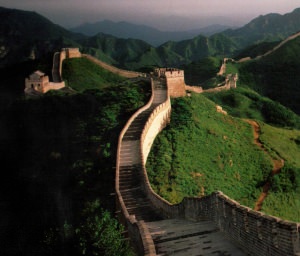The City of Beijing has changed immeasurably. The days of the bicycle are long gone, replaced by considerably more automobiles than was the case when I last visited China in 1989.
My second trip to the Great Wall was as enjoyable as the first. Construction on the 2,480-mile long fortifications began in the 5th century BCE and was only finished in the 16th century CE.
I also made a trip to the famous Tiananmen Square. Known as the Gate of Heavenly Peace, it lies in the very heart of the City and is said to be one of the greatest public squares on earth. Tiananmen Square is the site of several famous uprisings in China’s history, including the eight rallies that began the Cultural Revolution in 1966 and the student uprisings in 1989. This visit is much quieter than my previous one (I was last there in August 1989), when bullet marked walls were still visible miles away from the square.
No visit to Beijing is complete without walking through the Forbidden City, the seat of power during five centuries of Chinese dynasties. This city is imperial and impressive and boasts three great ceremonial halls and three principal palaces where extravagant living quarters housed more than 34 successive emperors.
I have been in Beijing, China now for a week. After meeting my local contact, making new business contacts and traveling through the city rings, I can share these tips on meeting and greeting in this country:
1. Names are crucial to the Chinese. Be certain you understand and establish how to address your contact during the first meeting. Given names (some common ones being Hua which means “flower” or “blossom” and Liang meaning “bright” or “brilliant”) are seldom used, except by close family and extremely special friends.
2. Remember that Chinese surnames are used first, not last. When you refer to a Chinese person by their surname, be sure to include their title, such as Mr. Wang; Madame Lin; Director Chen, or Engineer Huang.
3. You may find that your Chinese friends invite you to use the term for a family relationship. For example, an elder male may be referred to as “Dàgē” (meaning “big or older brother”) and a young female may be referred to as “Xiǎo jiěmèi” (or “little sister”). In which case, you would respond by using that reference also.
4. It is an especially gracious form of business address to drop the ‘deputy’ in a Chinese official’s name. In which case you would refer to a Vice Minister simply as “Minister.”
5. Meeting and seeing off important business contacts at the airport is considered extremely courteous by the Chinese and something important to do. It is a small thing that can have considerable impact on how well you are remembered and appreciated by those you with whom you are doing business.
6. It can seem unnecessary or tedious for us in the west to have to clarify our qualifications and status with Chinese connections up front. Just remember that position in a hierarchy is of considerable concern and interest to the Chinese. Business women, in particular, should take note of this, as I did by ensuring my Chinese connections knew in advance that I have a law degree (JD) by emailing my CV. If you want to be taken seriously, you must be willing to show your pedigree and status.



Leave A Comment